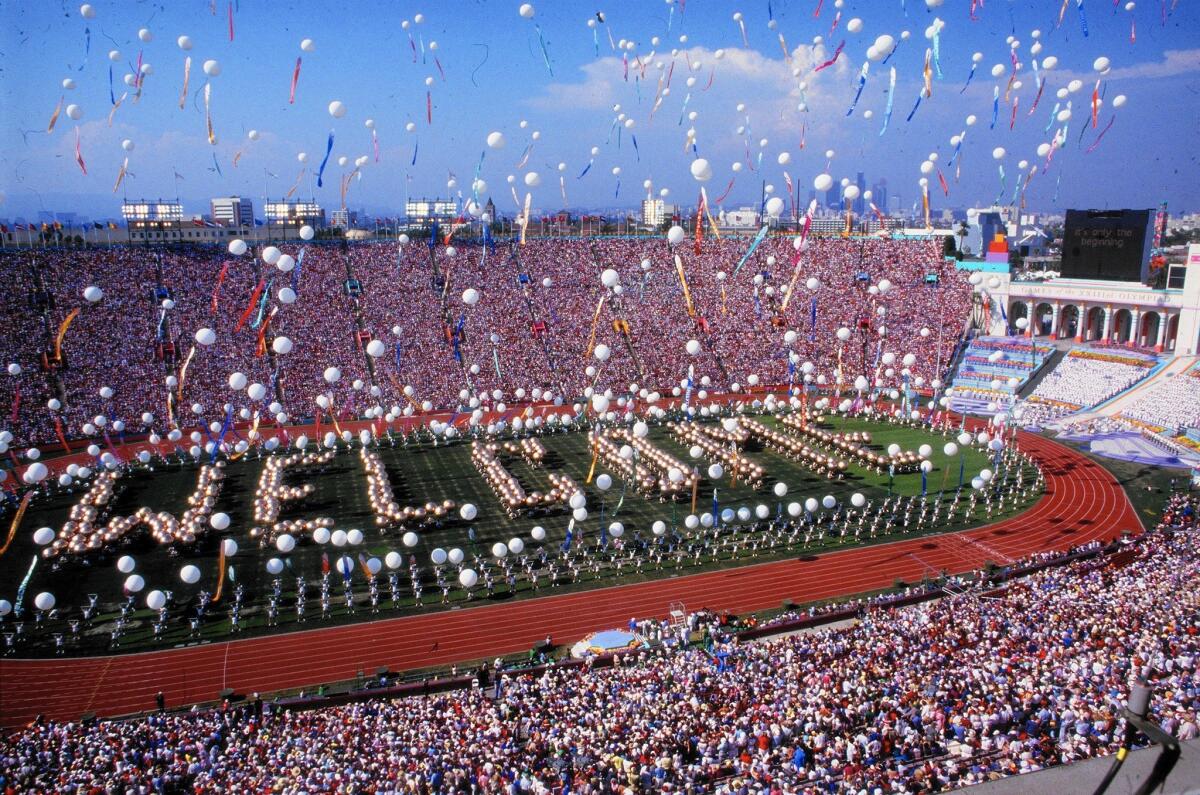L.A.’s Mayor Garcetti is mum on financial pledge for 2024 Olympics

The 1984 Summer Games in Los Angeles were the modern prototype of a profitable Olympics. Above, the opening ceremonies at the Coliseum.
With Los Angeles’ hopes of hosting the 2024 Summer Games unexpectedly revived, Mayor Eric Garcetti must soon decide whether he is willing to accept the sort of financial risks that his counterpart in Boston — the U.S. Olympic Committee’s first choice of host city — balked at this week.
Olympic officials insist that a host city pledge to cover cost overruns or revenue shortfalls associated with the Games. Boston Mayor Martin Walsh expressed second thoughts about providing such a guarantee shortly before his city withdrew Monday.
Garcetti is sounding optimistic notes after Boston’s withdrawal of its bid. But so far he hasn’t said what promises he is prepared to make on taxpayers’ behalf in exchange for the chance to attract an event that could contribute significantly to both the region’s economy and his mayoral legacy.
Before Boston’s selection in January, representatives from all four finalist cities — Boston, L.A., San Francisco and Washington — had signaled their willingness to cover cost overruns. But Walsh’s dramatic reversal is likely to make such a commitment a central issue for any city that hopes to take Boston’s place.
“It was legitimately a major concern for us,” said Chris Dempsey, co-chairman of No Boston Olympics, a group that helped rally public opinion against the Games. “Essentially, there was almost unlimited downside for the public.”
Jeff Millman, a senior Garcetti aide, said in a statement that the Games pose no real risk to L.A. taxpayers. “If we bid, our city’s existing world-class venues would make an Olympics in Los Angeles profitable just as it was in 1984 and 1932,” he said.
The mayor’s office declined Tuesday to address questions about Garcetti’s position on a city guarantee against Olympic financial losses.
Garcetti has built a reputation for seeking to avoid or delay up-or-down decisions on divisive issues. If his administration pushes ahead with its Olympic ambitions, he will need to either persuade the committee to back off its demand for a financial backstop or decide that the risk is worth the prestige of bringing the Games to L.A. for the first time in four decades.
The latter course could prove unpopular in a city that still bears the budgetary scars of the Great Recession. And it could be a tough sell to a public with memories of the 1984 Olympics, when L.A. became the only Olympic host city in modern history to refuse to put taxpayer money on the line. At the insistence of then-Mayor Tom Bradley and the City Council, the International Olympic Committee included a clause in its contract with L.A. that absolved the city of financial liability.
“I think it would be very difficult for any mayor to sign an agreement where we put taxpayer money at risk,” said L.A. political consultant Rick Taylor. “If it didn’t happen in 1984, I can’t see it happening in 2024.”
Olympic Games are paid for by their host cities’ organizing committees, which draw money from a complicated array of sources, including IOC funds, ticket sales and sponsorship and television deals. The events’ final price tags vary widely: London’s organizing committee spent about $15 billion on the 2012 Summer Games, while the 2014 Winter Games in Sochi, Russia — which featured extravagant investments in infrastructure — cost roughly $51 billion.
Should L.A. decide to pursue the U.S. Olympic bid, city officials are likely to feel pressure to make public their estimate of the costs of hosting the 2024 Games. That figure was prepared as part of the city’s proposal but not disclosed after the committee chose Boston.
The 1984 Summer Games were the modern prototype of a profitable Olympics. But there also have been catastrophes. The 1976 Summer Games, for example, left Montreal $1.5 billion in debt and nearly bankrupt.
Andrew Zimbalist, an economics professor at Smith College who has studied the economics of hosting the Olympics, said he doesn’t foresee L.A. landing the 2024 Games absent a promise to insulate the IOC from cost overruns. “Garcetti will have to issue that guarantee,” he said.
Zimbalist said L.A. has financial advantages over other cities because of venues and infrastructure that remain from 1984. Nevertheless, he suggested Garcetti should “proceed with extreme caution” in light of the potential expenses to which taxpayers could be exposed.
The mayor doesn’t have much time to decide: The IOC’s deadline for bids falls in mid-September.
Unlike Boston, where a vocal group of activists began opposing the city’s bid even before it was officially chosen by the USOC, no widespread criticism of hosting the Olympics has yet emerged in L.A. That could be in part because of the low-profile approach Garcetti and other civic leaders adopted in trying to woo the Olympics back to L.A. a third time.
Nevertheless, at least some L.A. neighborhood leaders say they admire Boston’s rationale for balking.
Jim O’Sullivan, president of the Miracle Mile Residential Assn., said he was impressed by Walsh’s willingness to walk away from the bidding process. He said Garcetti should publicly promise that L.A. taxpayers wouldn’t be on the hook for Olympics-related expenses.
“I think [Boston] looked at it and said, ‘Hey, we can’t afford this,’” O’Sullivan said. “I have to stand up and respect that.”
Follow @PeteJamison for news from L.A. City Hall.
Times staff writers David Wharton and David Zahniser contributed to this report.
ALSO:
U.S. Olympic Committee contacts Los Angeles about 2024 Summer Games
Boston ends bid to host 2024 Olympics, giving Los Angeles an opportunity
What would a potential Olympic bid mean for L.A.?
More to Read
Sign up for Essential California
The most important California stories and recommendations in your inbox every morning.
You may occasionally receive promotional content from the Los Angeles Times.











